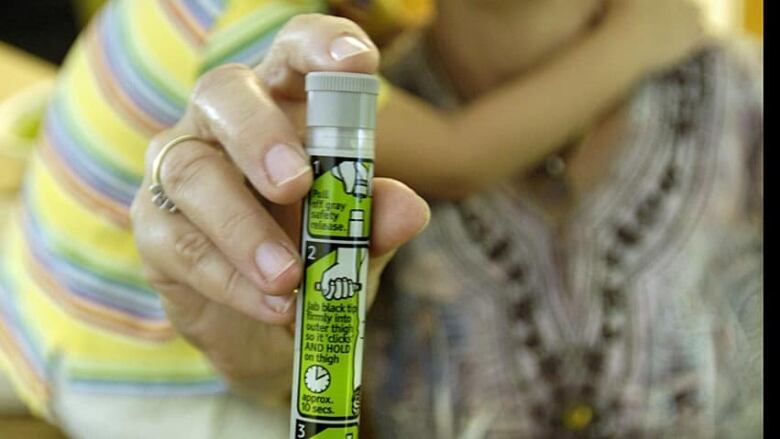Public health pushes for firefighters to carry epinephrine injectors
Training firefighters and equipping trucks with epinephrine could cost the city around $25,500

When Hamilton firefighters arrive first to a medical emergencythat involves an acuteallergic reaction, they should be able to administer a life-saving shot of epinephrine,says Hamilton public health officials.
Unlike other firefighters in Ontario, those in Hamiltondon't carry epinephrine injectors, sometimes calledEpiPens.For callsthat require one and when seconds count,firefighters have to wait for paramedics to arrive.
The city's board of health will meet Monday to discuss a proposal that would see epinephrine injectorsplaced onall front line fire trucks that could be sent to medical calls. A formal recommendation from the Hamilton Fire Department and the city's Public Health Services will be presented at the meeting.
RELATED:Mall security guards have never needed EpiPens in Hamilton pilot project
RELATED:Jackson Square to be first mall in Canada to have public EpiPens
The cost of the proposed program, including purchase and training,would be approximately $25,500, the document reads. If the proposal is approved, thiscost would be absorbed in the 2016 fire department operating budget.
Epinephrine is also known as adrenalin. The injectors are disposable needles that are roughlythe size of ahighlighterand are typically carried by people with severe allergies to things like peanuts, shellfish or bee stings.
It would cost an additional$23,000every other year to maintain the program. The devicesexpire after 18 months and would need to be replaced, whether or not they're used.
Firefighters sometimes the first on scene for medical calls
Between August 2015 and January 2016, Hamilton Paramedics responded to 99 calls for suspected anaphylaxis, the recommendation reads. Of those 99 incidents, firefighters were the first to arriveon scene fornearly one out of every five calls.
Of those 99 incidents, 32 patients usedtheir own epinephrine injectorsbefore first responders arrived and 48 patients received epinephrine from paramedics.
Epinephrine is considered the therapy of choice by first responders when dealing with any anaphylactic reaction, the recommendation states.When the drug is administered,it is injected into a muscle. With this type oftreatment, there is a low risk of resultinghealthcomplications, the proposal reads.
If the board approves the recommendation from public health, Hamilton will follow after other cities that have already allowed their fire departments to carry epinephrine injectors, includingBrampton, Niagara Fallsand Toronto.












_(720p).jpg)


 OFFICIAL HD MUSIC VIDEO.jpg)
.jpg)



























































































